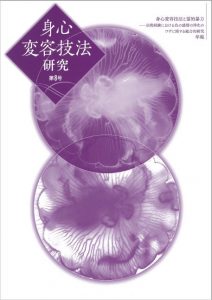A Paper by Prof. Kawai was Published in the 8th Issue of The Investigation of Arts and Principles of Body-Mind Transformation

A paper by Prof. Toshio Kawai was published in the 8th issue of The Investigation of Arts and Principles of Body-Mind Transformation, which is headed by Prof. Toji Kamata.
Kawai, Toshio (2019). Tension and paradoxes in the relationship between decision or indecision in techniques for transforming the body and mind: The relationship between psychotherapy and modern consciousness. Techniques for Transformation of Body and Mind, 8, 205-210.
Contents
1. Psychotherapy and the dialectic of states of decision and indecision.
2. Theoretical background: A neuroscience and indecision.
3. Changes in symptoms regarding undecided things
4. Cultural and modern backgrounds of undecided things
5. Tips on how to relate to undecided things
The author argues that a strong tension arises when decisions are made during psychotherapy because there is no immediate need for problem solving in therapy, whereas day-to-day situations do require problems to be solved. In modern times, there has been a trend towards increasingly transparent efficiency regarding the results of cognitive behavioral therapy. On the other hand, the author discusses how the findings of neuroscience research supports both the argument that brain functioning regarding undecided things when creativity is concerned and also support the basic stance of psychotherapy, which is not well understood in modern times.
In Jungian psychotherapy, it is important for something to change naturally, moving from a state of indecision to a state of decision. To maintain a state of indecision, there are precedents for having an established ego that includes having clarity about one’s own position and ability to decide.
However, in recent years there has been an increase in people with developmental disabilities who have a weakened individuality and indecisiveness. The author argues that trend of remaining undecided among people without developmental disabilities has gotten stronger because people today have multiple opportunities due to changes that are created when a traditional society becomes less structural.
Buddhist ethics and practices, as well as novels by Murakami, are discussed as being able to offer clues about how to relate to undecided things.
2019/04/17